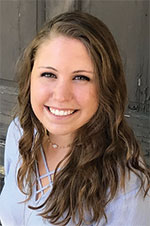Reflection / Alicia Nygra
Living Laudato Si’ through a sustainability pilot program
 Over the summer, four parishes—Our Lady of Lourdes, St. Mary, St. Matthew the Apostle, and Holy Spirit—and Father Thomas Scecina Memorial High School, all in Indianapolis, participated in a 10-week sustainability pilot program.
Over the summer, four parishes—Our Lady of Lourdes, St. Mary, St. Matthew the Apostle, and Holy Spirit—and Father Thomas Scecina Memorial High School, all in Indianapolis, participated in a 10-week sustainability pilot program.
What is sustainability? Simply put, sustainability is using resources in a way that meets our needs without compromising future generations’ ability to meet their own needs.
This program, led by the archdiocesan Creation Care Commission, was inspired by the call to action presented in Pope Francis’ 2015 encyclical “Laudato Si’: On Care for Our Common Home.”
The program had several components. The main component was a comprehensive assessment of all areas of operation, including: energy use, water use, building operations, food preparation and service, waste management, transportation, outdoor space and purchasing. We then used these assessments to develop a 12-month sustainability action plan tailored to each specific participant.
When deciding what improvements to include in their action plans, participants considered “good, better and best” practices for each area of assessment, as well as estimated cost and timeline for each step.
Another component was education. The Creation Care Commission coordinated two educational workshops for the program. The first one, conducted by Hoosier Interfaith Power and Light, focused on energy efficiency in sacred spaces. The second was a workshop that covered the basics of climate science, Catholic social teaching on climate change, and best operational practices for parish facilities and schools. Both workshops gave attendees practical information on implementing sustainable practices within their parish and/or school.
Now that participants have their action plans, they will begin the implementation phase. Over the next 12 months, stakeholders in each parish and/or school will work with support from the Creation Care Commission to carry out their plan. The Season of Creation, which begins on Sept. 1 and runs through Oct. 4, will help boost morale and get parishes involved in this ministry.
As participants implement their action plans, more workshops will be scheduled to give them assistance in topics such as composting recycling, green purchasing, etc. The commission also created a toolkit of resources for participants and other parishes and schools in the archdiocese.
The Creation Care Commission firmly believes that caring for creation by living sustainably is a moral imperative as it relates to respecting the inherent dignity of all life. Past and present leaders of the Church have expressed similar sentiments.
While Pope Francis published Laudato Si’ and called us to action for creation care, his predecessors also had strong feelings about caring for the environment.
St. John Paul II once said that “the most profound and serious indication of the moral implications underlying the ecological problem is the lack of respect for life evident in many of the patterns of environmental pollution.”
Pope Emeritus Benedict XVI asserted that “the environment is God’s gift to everyone, and in our use of it we have a responsibility toward the poor, toward future generations, and toward humanity as a whole.”
There is no doubt that we as Catholic Christians are called to do our part in caring for God’s creation. Any action—no matter how small it may seem—can have a profound impact in creating positive change in caring for our common home.
Therefore, we are guided by the wise words of these vicars of Christ as we complete this pilot program and integrate sustainability into the daily operations of our archdiocese.
(Alicia Nygra is an intern for Mundell & Associates, an environmental services consulting firm in Indianapolis. For more information about the archdiocese’s sustainability program, go to www.archindy.org/creationcare or contact Deacon Michael Braun, director of the Secretariat of Pastoral Ministries, at 317-236-1531 or mbraun@archindy.org.) †
 Over the summer, four parishes—Our Lady of Lourdes, St. Mary, St. Matthew the Apostle, and Holy Spirit—and Father Thomas Scecina Memorial High School, all in Indianapolis, participated in a 10-week sustainability pilot program.
Over the summer, four parishes—Our Lady of Lourdes, St. Mary, St. Matthew the Apostle, and Holy Spirit—and Father Thomas Scecina Memorial High School, all in Indianapolis, participated in a 10-week sustainability pilot program.